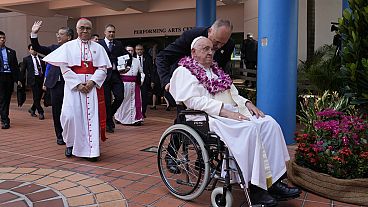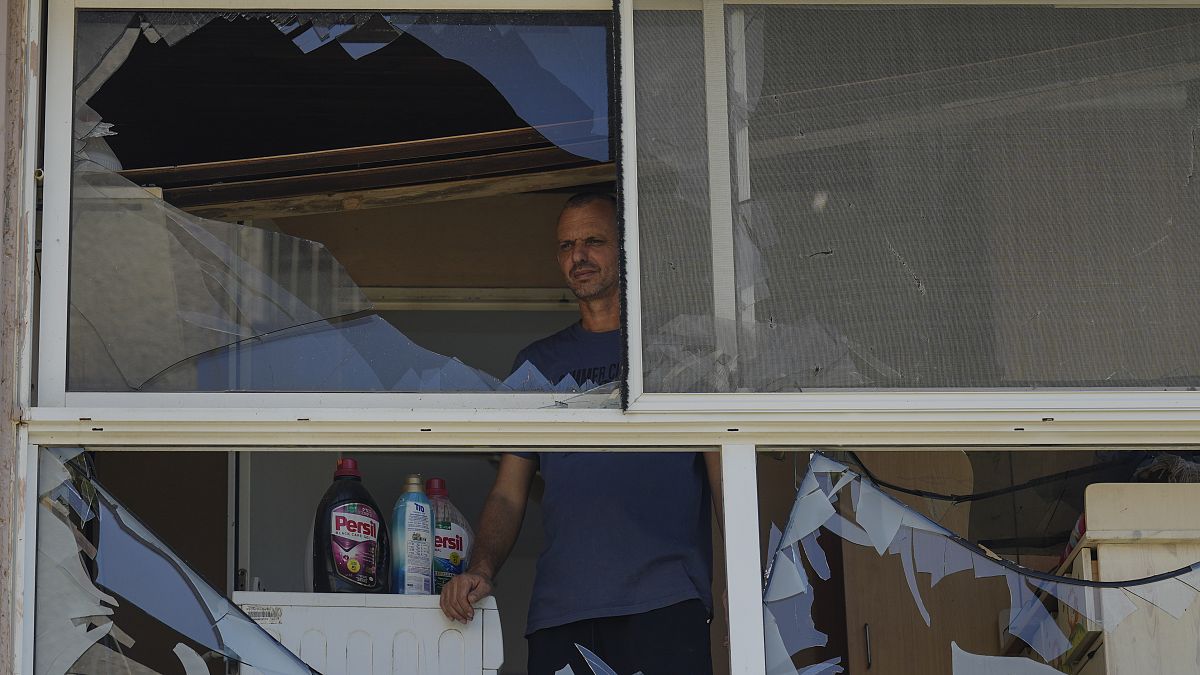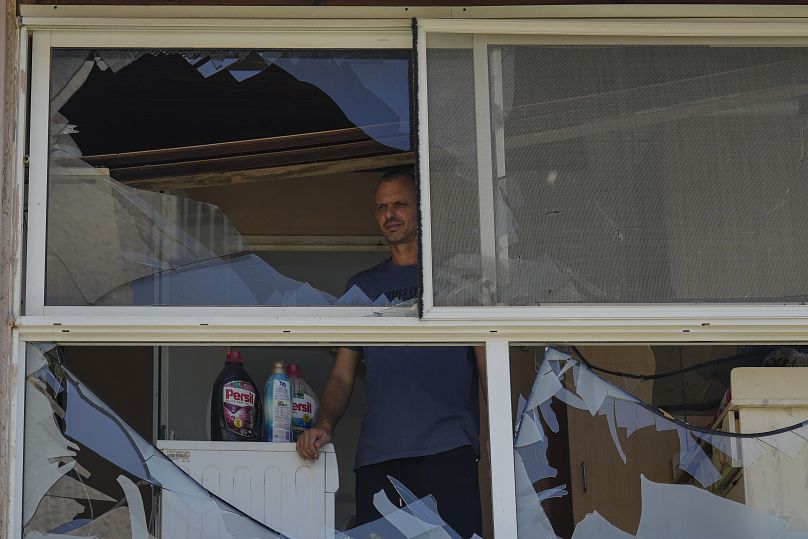Israel launched a wave of airstrikes across southern Lebanon early on Sunday whilst Hezbollah fired hundreds of rockets and drones at it.
Israel launched a wave of airstrikes across southern Lebanon early on Sunday in what it said was a pre-emptive strike on Hezbollah. The militant group responded that it had launched hundreds of rockets and drones to avenge the killing of one of its top commanders last month.
The heavy exchange of fire does not appear to have ignited a long-feared war, but the situation remains tense. Meanwhile, Egypt on Sunday is hosting high-level talks aimed at brokering a cease-fire in the 10-month-old Israel-Hamas war in Gaza, which diplomats hope will tamp down regional tensions.
The Israeli military said it struck because Hezbollah was planning to launch a heavy barrage of rockets and missiles toward Israel. Soon after, Hezbollah announced it had launched an attack on Israeli military positions as an initial response to the killing of Fouad Shukur, one of its founding members, in an Israeli airstrike in Beirut last month.
By mid-morning, it appeared that the exchange had ended, with both sides saying they had only aimed at military targets. At least three people were killed in the strikes on Lebanon, while there were no reports of casualties in Israel, although at least one house in Acre in northern Israel was damaged.
Israeli Prime Minister Benjamin Netanyahu, speaking at the start of a Cabinet meeting, said the military had eliminated “thousands of rockets that were aimed at northern Israel” and urged citizens to adhere to directives from the Home Front Command.
“We are determined to do everything to defend our country, to return the residents of the north securely to their homes and to continue upholding a simple rule: Whoever harms us — we will harm them,” he said.
The Quds News Network, a pro-Palestinian news agency, posted photos of some of Israel's airstrikes on X.
The Israeli military said Hezbollah was planning to launch a heavy barrage of rockets and missiles toward Israel. Soon after, Hezbollah announced it had launched an attack on Israeli military positions as an initial response to the killing of Fouad Shukur, one of its founders, in an Israeli airstrike in Beirut last month.
Israel remains tense
Air raid sirens were reported throughout northern Israel, and Israel's Ben-Gurion international airport closed and diverted flights for approximately an hour due to the threat of attack. Israel’s Home Front Command raised the alert level in northern Israel and encouraged people to stay near bomb shelters.
Lt. Col. Nadav Shoshani, an Israeli military spokesman, said Hezbollah had intended to hit targets in northern and central Israel. He said initial assessments found “very little damage” in Israel, but that the military remained on high alert. He said around 100 Israeli aircraft took part in Sunday’s strikes.
Strikes on southern Lebanon kill at least two people
Lebanon’s Health Ministry reported that two people were killed and another two wounded in the strikes in southern Lebanon. Separately, a fighter for the Amal group, which is allied with Hezbollah, was killed in a strike on a car, Amal said.
Hezbollah said its attack involved more than 320 Katyusha rockets aimed at multiple sites in Israel and a “large number” of drones. It said the operation was targeting “a qualitative Israeli military target that will be announced later” as well as “enemy sites and barracks and Iron Dome (missile defence) platforms.”
Hezbollah later announced the end of what it said was the first stage of retaliatory strikes, which it said would allow it to launch more attacks deeper into Israel. But a later statement said “military operations for today have been completed.”
The group said all the exploding drones it launched hit their targets, without saying how many. It listed 11 bases, barracks and military positions that it said it targeted in northern Israel and the Israeli-annexed Golan Heights. It also dismissed Israel's claim to have thwarted a stronger Hezbollah attack. Hezbollah did not provide evidence for its claims.
On Saturday afternoon Hezbollah leader Hassan Nasrallah gave a televised speech promising to attack Israel again - if the rocket targeting was not "satisfactory."
He also described the main target as "the military base in the Glilot area" and said Israel was not revealing the extent of Hezbollah's attack on it.
Israel and Hezbollah have been exchanging fire almost daily, displacing tens of thousands of people on both sides of the border. Until Sunday, both sides had been careful to avoid an all-out war.
Hezbollah, which fought Israel to a stalemate in the summer of 2006, is believed to be far more powerful than it was during that conflict.
We are monitoring the situation, says US
In the US, a spokesman for the National Security Council, Sean Savett, said President Joe Biden was “closely monitoring events in Israel and Lebanon.”
“At his direction, senior U.S. officials have been communicating continuously with their Israeli counterparts,” Savett added. "We will keep supporting Israel’s right to defend itself, and we will keep working for regional stability.”
The Pentagon said Defence Secretary Lloyd Austin spoke with his Israeli counterpart, Yoav Gallant, about Israel's defences against Hezbollah. Austin “reaffirmed the United States’ ironclad commitment to Israel’s defence against any attacks by Iran and its regional partners and proxies,” a statement said.
Randa Slim, a senior fellow at the Washington, D.C.-based Middle East Institute, said Sunday morning’s exchange was “still within the rules of engagement and unlikely at this point to lead to an all out war.”
In recent weeks, diplomats from the U.S. and European countries have made a flurry of visits to Israel and Lebanon in an attempt to tamp down the escalation that they fear could spiral into a regional war.
Last week, Israel’s defence minister said he was moving more troops toward the Lebanese border in anticipation of possible fighting with Hezbollah.
Rear Adm. Daniel Hagari, another Israeli military spokesman, said the military had struck in self-defence.
“We can see that Hezbollah is preparing to launch an extensive attack on Israel, while endangering the Lebanese civilians," he added, without providing details. ”We warn the civilians located in the areas where Hezbollah is operating to move out of harm’s way immediately for their own safety,” he added.
The United States and Israel estimate it has some 150,000 rockets and is capable of hitting anywhere inside Israel.
The group has developed drones capable of evading Israel's defences as well as precision-guided munitions.
Israel has one of the world’s best militaries and an extensive multi-tiered missile defence system, and it is backed by a U.S.-led coalition that helped it shoot down hundreds of missiles and drones fired from Iran earlier this year. The U.S. military has been building up its forces across the region in recent weeks.
Israel has vowed a crushing response in the case of an all-out war, one that would likely demolish critical civilian infrastructure, especially in south Beirut and southern Lebanon, where Hezbollah’s main strongholds are located. A war would likely displace hundreds of thousands of people on both sides.
Hezbollah is a close ally of Iran, which has also threatened to retaliate for the killing of a senior Hamas leader, Ismail Haniyeh, in an explosion in Tehran last month that was widely blamed on Israel, which has not said whether it was involved.
The group began attacking Israel almost immediately after the start of the war in Gaza, which was triggered by Hamas' Oct. 7 attack on Israel.













